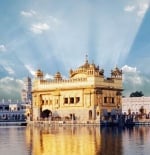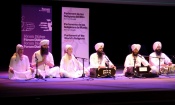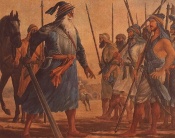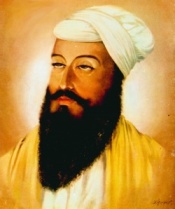Essence of Sikhism
| Part of a series on Sikhism |
|
|
Sikhism (Sikhi, ਸਿੱਖੀ in Panjabi) is one of the major world religions, primarily developed in 16th and 17th century India. "Sikhi" comes from the word "Sikh", and the word "Sikh" comes from the Sanskrit root "śiṣya" (शिषढ़य) which means "disciple" or "learner".
Guru Nanak was the founder of Sikhi. He was born in 1469 in the village of Nankana Sahib, near Lahore in present-day Pakistan previously part of a sub-continent known as Hindustan.
The Sikh faith system is based on the teachings of Guru Nanak and ten successive Sikh Gurus (the last one being the sacred text Guru Granth Sahib) and is the fifth-largest organized religion in the world. This system of religious philosophy and expression has been traditionally known as the Gurmat (literally the counsel of the gurus) or the Sikh Dharma.
Guru Granth Sahib (also called the Adi Granth) is more than just a scripture of the Sikhs, for the Sikhs treat this Granth (holy book) as their living Guru. The holy text spans 1430 pages and contains the actual words spoken by the founders of the Sikh religion (the Ten Gurus of Sikhism) and the words of various other Saints from other religions including Hinduism and Islam.
The Guru Granth Sahib was given the Guruship by the last of the living Sikh Masters, Guru Gobind Singh in 1708.
Background and First Impressions
This article is about the beliefs, principles and concepts of this faith system. Newcomers to this faith system have always been surprised by the modern ideas and practises expressed by the scriptures of this religion. In 1962, Miss Pearl S. Buck, a Nobel laureate was given an English translation of the Guru Granth Sahib. This is what she wrote about the incident:
"When I was in India in 1962, one of the notable events of my Visit was the presentation to me of the English version of Sri Guru-Granth Sahib, translated and annotated by Dr. Gopal Singh. I was deeply grateful to receive this great work, for in the original it was inaccessible to me, and this was a matter of regret, for I have had many Sikh friends, and have always admired their qualities of character. Now that I have had time in my quiet Pennsylvania home to read their scriptures slowly and thoughtfully, I can understand why I have found so much to admire. The religion of a people has a profound and subtle influence upon them as a whole, and this is true whether individuals do or do not profess to be religious."
Arnold Toynbee a British Historian when writing the Foreword in "The Sacred Writings of the Sikhs" by UNESCO wrote:
"Mankind’s religious future may be obscure; yet one thing can be foreseen. The living higher religions are going to influence each other more than ever before, in the days of increasing communications between all parts of the world and branches of human race. In this coming religious debate, the Sikh religion and its scriptures, the Guru Granth, will have something special of value to say to the rest of the world."
The Essence of this faith
There is only One God
- Main article: One God
and the Sri Guru Granth Sahib, the Sikh holy scripture
begins with the word:
which basically means - There is only One God.
The fundamental belief of Sikhism is that God exists, not merely as an idea or concept, but as a Real Entity, indescribable yet knowable and perceivable to anyone who is prepare to dedicate the time and energy to become perceptive to His persona. The Gurus never spoke about proofs of the existence of God: For them He is too real and obvious to need any logical proof.
Guru Arjan, Nanak V, says, "God is beyond colour and form, yet His presence is clearly visible" (SGGS 74), and again, "Nanak's Lord transcends the world as well as the scriptures of the east and the west, and yet he is clearly manifest" (SGGS 397).
In any case, knowledge of the ultimate Reality is not a matter for reason; it comes by revelation of Himself through "nadir" or grace and by "anubhava" or mystical experience. Says Guru Nanak, "budhi pathi na paiai bahu chaturaiai bhai milai mani bhane" which translates to "He is not accessible through intellect, or through mere scholarship or cleverness at argument; He is met, when He pleases, through devotion" (SGGS 436).
All Peoples of the World are Equal
- Main article: Equality of mankind
The Guru Granth Sahib promotes the message of equality of all beings. Discrimination of all types is strictly forbidden. Since Fatherhood of God was the basic Sikh tenet, sisterhood/brotherhood of humans ipso facto became its social corollary. No one was to be reckoned low or high –“Reckon the entire mankind as One” (Akal Ustat, 15.85) was the Guru Gobind Singh’s precept.
The Gurus went further than just proclaiming the equality of humans. They established dignity of labour, by making social service (seva) as an important vehicle of spiritual advancement. “The hands and feet that shun seva are condemnable; actions other than seva are fruitless” (Bhai Gurdas, Varan, XXVII. 10). Begging is taboo for the Sikhs. While bhaktas could live on alms and public charity, not so a Sikh. He is ordained to earn his living by the honest labour of his hands (kirat) and share his earnings with others. It rehearsed in the fifteenth century the ideology of fraternity, equality and liberty. The Gurbani below gives a general idea of the message put forward by the Gurus:
{{tuk1|446|20189|They look upon all with equality, and recognize the Supreme Soul, the Lord, pervading among all.
Women as Equals
- Main article: Sikh women
A drastic distinction between the roles of the male and female exists in all the history of modern human societies. Women have grown to accept, not without resentment though, the male-dominated atmosphere of the world. Because people use religious doctrine to define their life styles, religious views in both the East and the West seem to condone, even encourage, the unequal treatment of women. In the 15th century, Guru Nanak established Sikhism, the first religion to advocate emphatically the equality of all people, especially women.
In a continent characterized by severe degradation of women, this bold declaration, along with others, determined to erase the impurities of the Indian society. However, prejudices and injustices based on gender linger even today. (by Valerie Kaur) www.sikhwomen.com
| SGGS Page 473 Shabad 1748 Read text in English at the bottom of the screen |
| "From woman, man is born; within woman, man is conceived; to woman he is engaged and married.
Woman becomes his friend; through woman, the future generations come. When his woman dies, he seeks another woman; to woman he is bound. So why call her bad? From her, kings are born. From woman, woman is born; without woman, there would be no one at all. O Nanak, only the True Lord is without a woman. That mouth which praises the Lord continually is blessed and beautiful. O Nanak, those faces shall be radiant in the Court of the True Lord. (2)" |
Seva
- Main article: Sewa
Seva also Sewa, short for the word Karseva refers to "selfless service", work or service performed without any thought of reward or personal benefit. All Sikhs are encouraged by their Guru (Guru Granth Sahib) to perform Seva or Selfless Service. This is not only good for community relations but also is good for the moral uplifting of the person. You will find Sikhs engaged in free service in Gurdwaras washing dishes, cleaning the floors, serving food, etc.
Sikhs are also encouraged to help the community by performing unpaid work in hospitals, 'old peoples' homes, community centres, etc. Volunteers engaged in Seva are referred to as Sevadars and for many people this activity forms an essential part of their life, providing spiritual fulfilment and practical benefits.
Sikhism is founded on principles of Sarbat da bhalla - working towards the "common good of all". For Sikhs, this means reaching out to serve and uplift all of humanity as an expression or devotion to the Creator. Many other Sikh institutes, such as Guru-ka-Langar, Kirtan, Paath, etc., depend on the performance of Seva by many in the congregation. So the principles of Seva underpin many Sikh values - such is the importance given to Seva in Sikhism.
This point is highlighted by the Guru in many places in the Guru Granth Sahib. The text explains the spiritual benefits of doing seva and the ways in which one should perform it, focussing on the state of the mind when performing seva.
Interfaith Harmony
- Main article: Interfaith
Sikhism is one religion, which is founded on the principles of global Interfaith communities and mutual Inter-community respect and harmony. The founders of Sikhism have since 1469 defined and preached the principles of interfaith respect, dialogue and harmony. A Sikh by definition must respect and accept all other world religions. Further, the Sikh must protect, guard and allow the free-practise of the customs and rituals of other religions.
The SGGS says on page 142:
| Without the Lord’s Name, life is worthless. Through doubt, the people are being destroyed. |
Khalsa is "God's army"
- Main article: Khalsa Kaal Purakh Ki Fauj
khhaalasaa kaal purakh ki fauj. pragattiou khhaalasaa pramaatham kee mauj.
Khalsa Kaal Purakh Ki Fauj is the Line of Saint-Soldiery, common among sikhs. These are words of Guru Gobind Singh. The purpose of the Khalsa as defined by the tenth Sikh Guru, Guru Gobind Singh who established the order of Sant Sipahi (Saintly warriors) was to act as "the army of God" to guard and protect everyone (not just Sikhs) and who always act according to their Gurus' teachings, rules and ethics were at act with charity, love and service to all human beings. The commandments of the Khalsa being enshrined in the Sri Guru Granth Sahib.
This brings unprecedented responsibilities and duties that need to be fulfilled by the Khalsa. If the Khalsa is truly Kaal Purakh's or Akal Purakh's fauj or "God's army" then the duties of the Khalsa is to serve the Almighty and the entire people of the world. This concept is all encompassing and cannot be used in a narrow sense to refer to the duties of the Khalsa to a small sect or elite group of men/women who share similar beliefs; the Khalsa must serve the wider world community as that is the goal set by the Gurus. If the Khalsa fails to serve this wider goal, it will be lacking in its duties to their Guru and will not fulfil the key requirement set out by the Sikh Gurus in Gurbani.
Guardian of human rights
In the 239 years of leadership provided by the living Sikh Gurus, many powerful lessons have been left for the Sikhs and for other people of the world to learn from. Beginning in 1469, with the birth of Sikhism's founder, Guru Nanak to the demise of the tenth and last living master of Sikhi, Guru Gobind Singh in 1708, the history of the Sikh Gurus is packed full of numerous events, incidents, occurrences, celebrations, confrontations, unions, and much more that gives, not only the Sikhs, but the citizens of the world, a clear and unique message and direction to the interested reader. These events in history are an example for the followers of the Gurus to learn from; to gain spiritual guidance and insight from, as each of us moulds our life to the path of dharma or righteousness.
The Sikh religion is somewhat unusual in the way that it was created; where most other of the world's religions have had a short span of birth of perhaps, no more than 40 to 70 years. Sikhi has taken a longer period in its creation phase. Ten human leaders nurtured Sikhi , as it evolved into a fully fledged world religion. Guru Nanak laid down the foundations of this faith and each subsequent Guru added to and reinforced the work done by his predecessors. In this way the light of Nanak was carried by 9 other souls until the Guruship was passed to the Guru Granth Sahib in 1708 by the last living, human Guru of the Sikhs - Guru Gobind Singh.
Recognize the human race as one

Guru Gobind Singh
One of Guru Gobind Singh’s main gifts to the world was the message of unity and equality of all the peoples of the world. The Guru was responsible for the unity of the peoples of Punjab and the message of the universal brotherhood of the human race. The Hindus, Muslim, Sikhs and others felt that they were treated fairly and equally within the domain of the Guru. The Guru’s mission was centred on Anandpur Sahib, which became the main centre of development during the time of the tenth master.
Prior to the arrival of Guru Tegh Bahadur the hill country around what would become Anandpur was made up of kingdoms ruled predominately by Hindus, where the Brahmanic brand of caste distinction was rigidly observed. Fellow human beings within the same religion worked each in his own sphere of carefully delineated castes each with its own duties.
The Hindu kingdoms were often at war with one another and were subjugated to the Mughal rulers who were at every chance attempting to win converts to Islam, particularly from the lower castes who were not even allowed to enter the temples of the religion that they were a part of. By joining Islam they could rapidly rise to rule those who had called them untouchable only days before. Wars and skirmishes were a common occurrence. However, in the kingdom ruled by the Sikhs slowly and steadily this mood of agitation changed with the introduction of a recognition of the unity of man.







